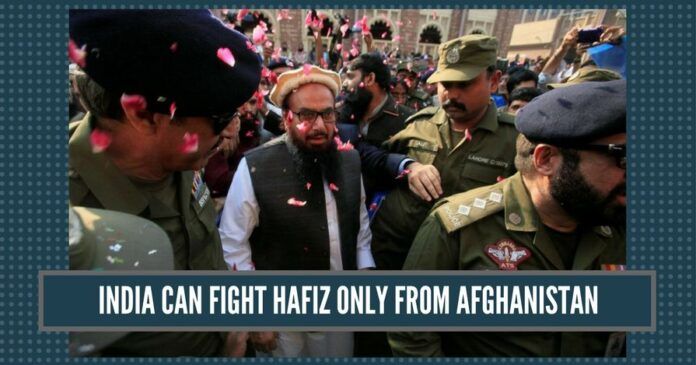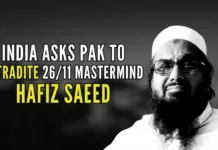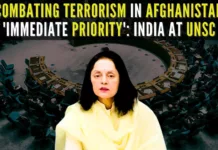
If Indian soldiers are stationed in Afghanistan, Pakistan’s worst nightmare will come true
There is nothing surprising in Pakistan’s release of Hafiz Saeed, the mastermind of 26/11 that left 166 people dead and much more wounded. With its military, society, intelligentsia, and government increasingly getting radicalized, our western neighbour is hurtling towards a jihadist future. Nor is there any surprise in the naivete of India’s ruling elite. Thanks to the naivete, there also seems to be the expectation that the US would act tough against Pakistan.
To be sure, Washington minced no words in its condemnation of Islamabad over the development. “Saeed’s release, after Pakistan’s failure to prosecute or charge him, sends a deeply troubling message about Pakistan’s commitment to combating international terrorism and belies Pakistani claims that it will not provide sanctuary for terrorists on its soil,” said press secretary Sara Huckabee Sanders. “If Pakistan does not take action to lawfully detain Saeed and charge him with his crimes, its inaction will have repercussions for bilateral relations and for Pakistan’s global reputation.”
Pakistan is the engine of global terror is widely acknowledged, even within Pakistan.
But wasn’t her statement predicated upon a great deal of fiction? “Pakistan’s commitment to combating international terrorism”—but was there any at any point in time? That Pakistan is the engine of global terror is widely acknowledged, even within Pakistan. And what “global reputation”? As far as the US-Pakistan bilateral ties are concerned, they are governed, like any other bilateral ties, by hard realities and not the nice sentiments that politicians express in nice surroundings. US-Pakistan relations have seen many a rough patch, including 9/11 and the Osama killing, but have continued nonetheless.
Characteristically, and unrealistically, New Delhi’s response to both Hafiz’ release and Sanders’ statement has been pro-forma. Official spokesperson Raveesh Kumar Hafiz’s “release confirms once again the lack of seriousness on the part of Pakistani Government in bringing to justice of heinous acts of terrorism including by individuals and entities designated by the United Nations.”
Further, he said, the release “also appears to be an attempt by the Pakistani system to [a] mainstream proscribed terrorist.” Appears to be? It is an attempt, Mr Kumar. But he was busy with his homilies, “It is the responsibility of Pakistani Government to fulfil its international obligations and take credible and effective action against terrorists like Hafiz Saeed.”
He also went on to deny “that there is a bit of softness by the US side on certain entities. I think we are trying to work together with them, we have worked with them and if you have seen the statements emanating from the US Administration in the past, I think it is very clear that we are on the same page as far as fighting terrorism is concerned.”
Kumar, indeed the Indian government, is absolutely wrong in asserting that India and the US “are on the same page as far as fighting terrorism is concerned.” The US wants India to send troops to Afghanistan, which India has refused to. Defence Minister Nirmala Sitharaman announced this decision after talks with her US counterpart James Mattis when the latter visited India in September.
For, in international affairs, it is often the longest distance between two points that is the straight line.
It is ironical that the US knows better than our policymakers what is in our national interest and how Pakistan’s evil designs can be contained; if Indian soldiers are stationed in Afghanistan, Pakistan’s worst nightmare will come true: it will be sandwiched between two hostile sides—Indian troops on its eastern border and Indian troops on its western border.
In this context, it is worth remembering the decision of Sardinian King Victor Emmanuel to ally with France and England in the Crimean War (1853–56), though it involved no Sardinian or Italian interests. Count Cavour, though initially reluctant, fully supported the King. Cavour said, “Out of this mud of Crimea, a new Italy will be made.” It indeed was made, a unified Italy, for being on the winning side ensured the benign neutrality of big powers to the unification efforts.
For, in international affairs, it is often the longest distance between two points that is the straight line. Unfortunately, foreign policy mandarins, still loitering in the deserts of non-alignment, are unable to recognize this truth. They fail to realize that making angry statements on Hafiz’s release would not contain Pakistan-inspired terror; boots on the ground in Afghanistan will.
Note:
1. The views expressed here are those of the author and do not necessarily represent or reflect the views of PGurus.
- Liberty Is Penalized, Violence Goes Untouched - December 21, 2019
- Rahul’s Howdy bloomer - September 22, 2019
- Chidambaram’s hypocrisy - August 22, 2019











[…] Read the full article: https://www.pgurus.com/india-can-fight-hafiz-afghanistan/ […]